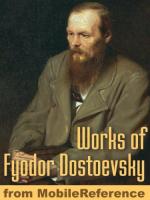|
This section contains 9,844 words (approx. 33 pages at 300 words per page) |

|
SOURCE: Slattery, Dennis Patrick. “Seized by the Muse: Dostoevsky's Convulsive Poetics in The Idiot.” Literature and Medicine 18, no. 1 (1999): 60-81.
In the following essay, Slattery surveys the impact that Dostoevsky's epilepsy had on his literary career, particularly as seen in The Idiot.
Few of us are not in some way infirm, or even diseased; and our very infirmities help us unexpectedly.
William James1
With few exceptions critics who undertake to explore the effects of Fyodor Dostoevsky's epilepsy on his writing life will often pass through the territory marked by Sigmund Freud in his clinical observations outlined in “Dostoevsky and Parricide.”2 Freud's analytic reading was for years taken as the definitive authority on family violence. In that essay Freud argues (wrongly, subsequent critics have almost unanimously agreed) that Dostoevsky's illness was not physiological but the consequence of hysterical reactions brought on by wanting his father dead and feeling guilt when...
|
This section contains 9,844 words (approx. 33 pages at 300 words per page) |

|


